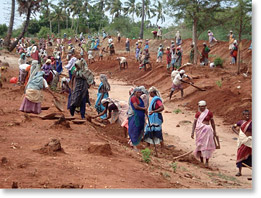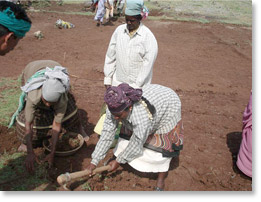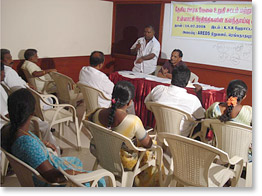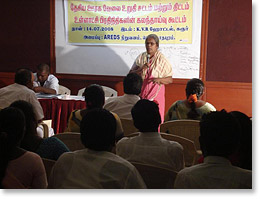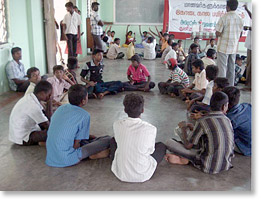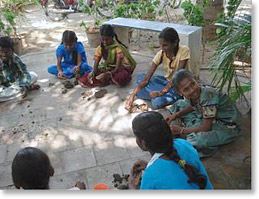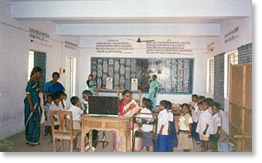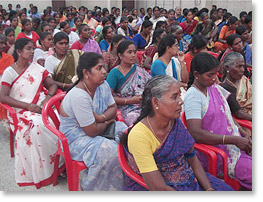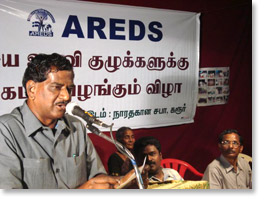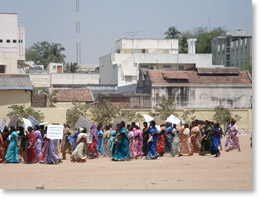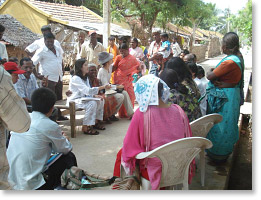|
Grassroots Organizing in Tamil Nadu
Confluence by AREDS Renganathapuram, Tamil Nadu, India
AREDS has initiated a new entity called ‘SHARE’ towards people-centred development with North-South interaction and solidarity. The prime objective of SHARE is to create strategies and space for the members of the North and South to become aware of the socio-politico-economic and cultural realities of the people in concern. Its specific objective is to enroll at least 10,000 members in SHARE from nations across Europe to ensure their involvement in terms of extending solidarity, fund raising, sharing views through an E-NewsLetter and participating in the campaigns. AREDS feels proud of releasing the first issue of this E-News Letter ‘Confluence’ for SHARE. Unplanned housing and unrestrained mining of sand have paved way for the destruction of rivers. As the sand is being transformed into a commodity, sand mafias have grown in the state. With their money, muscle and political power, they ravage the sand resources beyond restoration resulting in the gradual death of rivers. The lacking in effective implementation of environmental laws and a degrading morality means easy entry for rowdy politicians and other big shots in the mining business. As a result, almost all the rivers in Tamil Nadu today are under illegal sand miners. “Do not pollute rivers with toxic effluents of dyeing units…” Karur is located in the midst of towns where hosieries and textiles units are functioning aplenty. These units are using chemicals and dyes at high concentration. As per the environmental law, they must drain the liquid wastes onto the soil after removing the toxic chemical contents present in the wastes. Cauvery is the largest river in Tamil Nadu that supplies water for irrigation in delta districts. Amaravathi and Noyyal are two other rivers that join Cauvery, ultimately. These rivers are flowing through the towns having dyeing units. The dyeing units, violating environmental laws, are draining the untreated effluents into Amaravathi and Noyyal, which ultimately join Cauvery. As a result, the river water and the groundwater resources in the rivers’ flowing areas is contaminated and polluted irreversibly. Consequently, there is a sharp decline in the growth of crops and the volume of agricultural produce in these areas. The Forum for Protecting Water and Livelihood Resources (FPWLR) and the Society of Women in Action for Total Empowerment (SWATE) held a public meeting of farmers affected by the pollution. The forum resolved to organise a big Peace Rally in August 2008, in order to sensitize the government to implement the environmental laws effectively and check pollution. “We are very happy with the scheme as it ensures employment for 100 days and fair wages for the work done.” AREDS undertook a study on the socio-economic impact of the National Rural Employment Guarantee Scheme (NREGS) in Thirukampuliyoore and Veerarakiyam Panchayats (Local Bodies) in Karur district. Field visits, interviews with the elected representatives of panchayats, and interactions with the beneficiaries were undertaken. The scheme, besides uniting the people of different villages, creates an ambience for them to express their fellowship and fraternity. We could witness people befriending each other irrespective of caste and even gender. Psychologically, this will help the workers cast away all their familial worries and involve them in work with much enthusiasm the next day. People expressed their willingness for the prolongation of the scheme throughout the year, indiscriminately, in both the panchayats. “Availability of employment means assurance of income, and with the income the parents could spend enough for the education of their children.” The implementation of NREGS solved this problem by ensuring employment opportunities for rural agricultural labourers for, at least, 100 days in a year. AREDS held a Consultation of the Elected Representatives of Local Bodies on the National Rural Employment Guarantee Scheme as a means of lobbying for the prolongation of the scheme. The panchayat presidents (presidents of local bodies) emphasized that the funds specified for panchayats should not be diverted to other schemes, at any cost, since the diversion of funds paralyses the functioning of panchayats. NREGS works must be implemented during the non-agricultural period so that, the workers can have livelihood resources throughout the year.
The summer camp is a part of Tulir Thalir Students Movement (Movement for Young Students and Adolescents) activities, which aims at helping school-going children studying in the 6th to 10th standards, spend their vacation joyfully as well as meaningfully. Cultural programmes, spoken English, computer skills, general knowledge acquisition, craftsmanship, playing and swimming are the main components of the summer camp. The summer camp motivates these students to pursue their higher studies after completing schooling. For this year, the summer camp was organised in May 2008. The children of TTSM motivate the dropouts in their respective villages and enroll them back into school. Children love to participate in the summer camps because they have access to what has been denied to them in family and society. The family, society, and school discriminate between girls and boys, upper castes and lower castes and the rich and, the poor. They do not find these meaningless barriers when they come to the summer camps. “All hotels and farms that engage child labour must be punished and penalised.” AREDS, joining hands with the district government administration, organises various programmes in Karur district on a need basis. Cultural Yatra (cultural march) is an effective form of propaganda for it includes singing, dancing, street play, and the like, as instruments. This year, a cultural yatra was organised in May-2008 in Karur district against child labour. Public meetings were held and cultural programmes were performed in Puliyoore, Velayuthampalayam, Thogamalai, Aravakurichi and Karur. The AREDS cultural team staged skits on the theme of child labour and its adverse impact on society in every village. Slogans, demanding legal action against the employers engaging child labour in their farms, hotels and the like, were raised in the yatra. As a result, awareness of the parents on education is increased and it is apparent through their increased interest in enrolling their children in schools. AREDS field staff closely monitor the enrollment process and take personal initiative to minimize the number of dropouts. The majority of the people of the target villages of AREDS are dalit agricultural labourers who have poor access to nutritious food and health care. Naturally, the children of these villages have poor health, which is an impediment to the progress of their learning process. In order to address the minor ailments and illnesses, AREDS organises health camps at villages periodically. As part of its regular medical intervention, AREDS, along with Joseph Eye Hospital, Trichy, organised a free eye camp for the elementary school children in five villages of Krishnarayapuram union. Out of 270 children, who were benefited in the camp, ten children were found to be vitamin ‘A’ deficient and two other children were referred to Joseph Hospital for further treatment. “We are giving out credit to the self help groups for the development of the rural masses” ‘In Panchayats where non-dalits are a majority, exercising one’s roles and responsibilities as Dalit representatives - even though she is a president - seems practically impossible.’ Gram Sabha is the collective of the entire voter population of a local body and convening Gram Sabha three times in a year is mandatory. AREDS has made an appraisal on Gram Sabha. The latest Gram Sabha conducted in 32 of the panchayats in Karur district on the 1st of May 2008 was taken as a cross-section. It was found that dissemination of information on Gram Sabha was inadequate, a quorum was absent, only the government-prepared agenda was discussed, and the government officials were halfhearted in conducting meetings in a majority of the Gram Sabhas. AREDS has appealed to the government to rectify all failings and shortcomings in organizing Gram Sabha meetings. “The government should issue the title deed of the free houses on the name of women” SWATE observed International Women’s Day with a rally across Karur and a public meeting at the Thiruvalluavar ground in Karur. About 3,000 members from the women movements took part in the rally. The demands for total prohibition of liquor, issuing of government houses on the name of women in the beneficiary families and 50% reservation for women in politics were raised by the participants. The women activists also demanded the government to construct toilets, free of cost, to all rural poor families in Karur district for ensuring health and sanitation at the grassroots level. About 75 women self-help group members from the Centre for Education and Empowerment of the Marginalised (CEEMA)-- a fraternal NGO working in a nearby town -- Erode - came on an exposure visit to AREDS and SWATE. They interacted with the leaders of AREDS-initiated people’s movements. The members learned that besides bringing in economic development, building up movements for social development -- retrieving women’s rights, gender equality and the like -- is also necessary. They, being inspired by SWATE bank, determined to start a bank, with similar operational principles, in their area of operation. Consultation on Panchayat Government Finances: Devolution, Allocation, and Utilization in Tamil Nadu, was held in ICSA, Chennai on the 14th of June 2008. Panchayat presidents from various districts of Tamil Nadu participated. They found the discussion on assessment and financial management in Panchayats to be very useful. The presidents expressed their idea of starting a district-level forum for panchayat presidents for better functioning. Mr. L.A. Samy was the chairperson for the fourth session of this consultation, in which the views of women presidents on Panchayat Government Finances: Devolution, Allocation, and Utilization in Tamil Nadu were discussed. Seminar towards implementing the UN Committee Recommendations of Economic Social and Cultural Rights in India was held for two days in July 2008, at Chennai. Mr. L.A. Samy, the director of AREDS, participated in the seminar. Ms. Maria Virginia B. Gome (Member, UN Committee on Economic Social and Cultural Rights, Geneva) chaired the seminar. Women and children, labour and employment, health and education, rural economic neglects, and other points of concern identified in the meeting were the points for discussion in the seminar. It was observed that: economic growth in India is not labour intensive as it does not coincide with the generation of employment opportunities; the wealth created out of the so-called present economic growth has not been equally distributed; both the socially-disadvantaged communities and the minorities are not equally enjoying the rights over economic, social and cultural rights as the elitists do and access to elementary education and health care is denied to the poor. It was decided to devise a Plan of Action for lobbying with the government agency, which is responsible for the implementation of economic, social and cultural rights. Centre for Exposure: A team of six students, representing Nepal, Laos, Thailand, Cambodia, Indonesia, and Hong Kong, visited AREDS for five days in the month of April 2008. They visited AREDS under the programme called ‘school of peace’ hosted by Visthar. Through the interaction with the villagers and field visits they became experientially aware of the plight of Dalit communities and the functioning of local bodies. Inspired by the history of Dr. Ambedkhar, who fought for Dalit rights, they paid floral tribute on his birthday. “Women are conservative and they must be emancipated” Seven university students from France visited and stayed with AREDS in June 2008. The students were interested to know about microcredit, the environment and agriculture, the global features of Indian socio-politico and economic development, and the position of women in society in the Indian context. They also stayed with the community members’ families at different villages. They said that staying with community members having entirely different economic, cultural and linguistic backgrounds was difficult but enriching and encouraging them to learn the dalit reality. The students -- as they have learnt through their interaction with the community members -- said that the women members of AREDS and SWATE are courageous and they had a burning spirit to change the society.
Published in In Motion Magazine March 9, 2009 Also see:
|
||||||||||||||||||||||||||||||||||||||||||||
If you have any thoughts on this or would like to contribute to an ongoing discussion in the  What is New? || Affirmative Action || Art Changes || Autonomy: Chiapas - California || Community Images || Education Rights || E-mail, Opinions and Discussion || En español || Essays from Ireland || Global Eyes || Healthcare || Human Rights/Civil Rights || Piri Thomas || Photo of the Week || QA: Interviews || Region || Rural America || Search || Donate || To be notified of new articles || Survey || In Motion Magazine's Store || In Motion Magazine Staff || In Unity Book of Photos || Links Around The World NPC Productions Copyright © 1995-2018 NPC Productions as a compilation. All Rights Reserved. |


